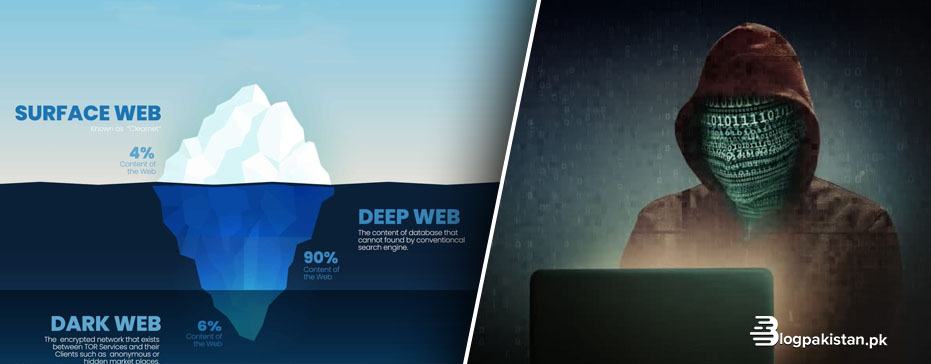The internet is an expansive network comprising various layers, with the surface web being the one we navigate daily through search engines like Google and Yahoo.
Surprisingly, this familiar surface web makes up only about 10% of the entire internet.
The remaining 90% resides beneath the surface, hidden from view. This hidden realm is known as the deep web, and its sheer size makes it nearly impossible to determine the exact number of active pages and websites at any given moment.
The Open Web
The surface web, often referred to as the open web, encompasses websites easily accessible via mainstream browsers like Google Chrome, Internet Explorer, and Firefox.
These websites typically have domain extensions like “.com” or “.org” and can be found through popular search engines. Search engines use a process called “crawling” to index these websites, making them readily discoverable.
The Deep Web
In contrast, the deep web includes web content that is not readily accessible through traditional search engines. Several reasons account for this invisibility:
- Unpublished Content: Some content, like unpublished blog posts, resides within the web but remains hidden until it is published.
- Protected by CAPTCHA, Password, or Subscription: Websites employing CAPTCHA verification, requiring account login, or offering access through subscriptions keep their content hidden until users complete the necessary processes.
- Content Accessible Through Specialized Tools: Certain information, such as university materials and government data, can only be accessed through specific websites or tools, rendering them hidden unless accessed through the designated means.
The deep web holds a wealth of information that extends beyond its enigmatic reputation. Researchers often utilize it to access hard-to-find data not available on the surface web.
Additionally, individuals in regions with restricted internet access use the deep web to express their opinions away from government surveillance. It also hosts obscure treasures from the past, such as books, comics, and fan art, which are inaccessible through regular search engines.
Even old research papers and writings, valuable for academic pursuits, can be found in this hidden realm.
It’s crucial to note that the deep web is not synonymous with the dark web. While both coexist within the hidden layers of the internet, the dark web represents a tiny fraction, approximately 10%, known for its association with illegal activities. Accessing the dark web is considerably more challenging due to encryption and its deliberate isolation from casual users.
How to Access the Deep Web
To access the deep web, one common method is using the Tor browser, short for The Onion Router. Tor allows users to reach websites not indexed by traditional search engines by peeling away encryption layers, similar to how layers of an onion are peeled.
Education and awareness are key to demystifying the deep web and encouraging responsible usage for educational and research purposes.
The Dark Web Within the Deep Web
Moving on to the dark web, it’s a subset of the deep web accessible only through specialized browsers. It provides anonymity by default, making it a hub for illicit online activities. Research shows that approximately 60% of darknet sites host illegal content, but legitimate websites also exist within this shadowy realm.
Special search engines like Candle, Not Evil, and SearX, along with Tor, are required to access the dark web. Due to the inherent anonymity, it’s challenging to identify users or shut down dark web servers.
In conclusion, the deep web is a vast repository of information hidden beneath the surface of the internet. It is a realm rich in resources, academic materials, and historical artifacts.
Distinguishing the deep web from the dark web is essential, as the former offers valuable opportunities for research, education, and exploration.
As awareness grows and responsible usage prevails, the deep web’s potential for knowledge and discovery continues to expand.
Want to stay updated with the latest and the most mind-blowing tech stories? Visit BlogPakistan.















